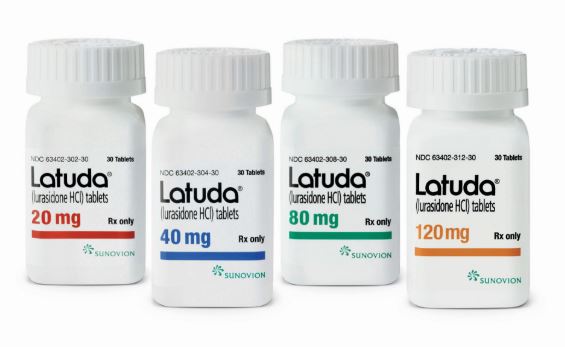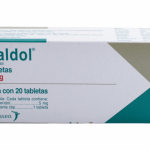Lurasidone (Latuda): Uses, Benefits Dosage, Side Effects, Reviews

What Is Lurasidone (Latuda) And What Does It Treat?
Lurasidone (Latuda) is an atypical antipsychotic medication that rebalances dopamine and serotonin to improve thinking, mood, and behavior.
Lurasidone (Latuda) is used to treat the symptoms of schizophrenia (a mental illness that causes disturbed or unusual thinking, loss of interest in life, and strong or inappropriate emotions) in adults and children 13 years of age and older. It is also used to treat depression in adults and children 10 years of age and older with bipolar disorder (manic depressive disorder; a disease that causes episodes of depression, episodes of mania, and other abnormal moods). Lurasidone is also used along with lithium (Lithobid) or valproate (Depacon) to treat depression in adults with bipolar disorder.
Lurasidone (Latuda) may also be helpful when prescribed “off-label” for other mental health conditions. “Off-label” means that it has not been approved by the Food and Drug Administration for this condition.
Your mental health provider should justify his or her thinking in recommending an “off-label” treatment. They should be clear about the limits of the research around that medication and if there are any other options.
What Is The Most Important Information I Should Know About Lurasidone (Latuda)?
Schizophrenia requires long-term treatment. Do not stop taking Lurasidone (Latuda), even when you feel better.
With input from you, your health care provider will assess how long you will need to take the medicine.
Missing doses of Lurasidone (Latuda) may increase your risk for a relapse in your symptoms.
Do not stop taking Lurasidone (Latuda) or change your dose without talking with your healthcare provider first.
For Lurasidone (Latuda) to work properly, it should be taken every day as ordered by your healthcare provider.
What Should I Discuss With My Healthcare Provider Before Taking Lurasidone (Latuda)?
• Symptoms of your condition that bother you the most
• If you have thoughts of suicide or harming yourself
• Medications you have taken in the past for your condition, whether they were effective or caused any adverse effects
• If you ever had muscle stiffness, shaking, tardive dyskinesia, neuroleptic malignant syndrome, or weight gain caused by a medication
• If you experience side effects from your medications, discuss them with your provider. Some side effects may pass with time, but others may require changes in the medication.
• Any psychiatric or medical problems you have, such as heart rhythm problems, long QT syndrome, heart attacks, diabetes, high cholesterol, or seizures
• If you have a family history of diabetes or heart disease
• All other medications you are currently taking (including over the counter products, herbal and nutritional supplements) and any medication allergies you have
• Other non-medication treatments you are receiving, such as talk therapy or substance abuse treatment. Your provider can explain how these different treatments work with the medication.
• If you are pregnant, plan to become pregnant, or are breast-feeding
• If you smoke, drink alcohol, or use illegal drugs
How Should I Take Lurasidone (Latuda)?
Lurasidone (Latuda) is usually taken 1 time per day with food (at least 350 calories).
Typically, patients begin at a low dose of medicine and the dose is increased slowly over several weeks.
For schizophrenia, the dose usually ranges from 40 mg to 160 mg. Only your healthcare provider can determine the correct dose for you.
For acute treatment of depressive episodes of bipolar disorder (when used alone or with lithium or valproate), the dose usually ranges from 20 mg to 120 mg. Only your healthcare provider can determine the correct dose for you.
Use a calendar, pillbox, alarm clock, or cell phone alert to help you remember to take your medication. You may also ask a family member or a friend to remind you or check in with you to be sure you are taking your medication.
What Happens If I Miss A Dose Of Lurasidone (Latuda)?
If you miss a dose of Lurasidone (Latuda), take it as soon as you remember, unless it is closer to the time of your next dose. Discuss this with your healthcare provider. Do not double your next dose or take more than what is prescribed.
What Should I Avoid While Taking Lurasidone (Latuda)?
Avoid drinking alcohol or using illegal drugs while you are taking Lurasidone (Latuda). They may decrease the benefits (e.g. worsen your confusion) and increase adverse effects (e.g. sedation) of the medication.
What Happens If I Overdose With Lurasidone (Latuda)?
If an overdose occurs, call your doctor or 911. You may need urgent medical care. You may also contact the poison control center at 1-800-222-1222. A specific treatment to reverse the effects of Lurasidone (Latuda) does not exist.
How Long Does It Take For Lurasidone (Latuda) To Work?
It is very important to tell your doctor how you feel things are going during the first few weeks after you start taking Lurasidone (Latuda). It will probably take several weeks to see big enough changes in your symptoms to decide if Lurasidone (Latuda) is the right medication for you.
Antipsychotic treatment is generally needed lifelong for persons with schizophrenia. Your doctor can best discuss the duration of treatment you need based on your symptoms and illness.
• Hallucinations, disorganized thinking, and delusions may improve in the first 1-2 weeks
• Sometimes these symptoms do not completely go away
• Motivation and desire to be around other people can take at least 1-2 weeks to improve
• Symptoms continue to get better the longer you take Lurasidone (Latuda)
• It may take 2-3 months before you get the full benefit of Lurasidone (Latuda)
Can a pregnant woman take Lurasidone (Latuda)?
If you are planning on becoming pregnant, notify your healthcare provider to best manage your medications. People living with schizophrenia who wish to become pregnant face important decisions. This is a complex decision since untreated schizophrenia has risks to the fetus, as well as the mother. It is important to discuss the risks and benefits of treatment with your doctor and caregivers.
Antipsychotic use during the third trimester of pregnancy has a risk for abnormal muscle movements (extrapyramidal symptoms [EPS]) and/or withdrawal symptoms in newborns following delivery. Symptoms in the newborn may include agitation, feeding disorder, hypertonia, hypotonia, respiratory distress, somnolence, and tremor; these effects may be self-limiting or require hospitalization.
Can a breastfeeding woman take Lurasidone (Latuda)?
No, breastfeeding while taking Lurasidone (Latuda) is not recommended. Animal studies suggest the drug may be passed through breast milk to the infant.
What Are The Possible Side Effects Of Lurasidone (Latuda)?
Lurasidone (Latuda) may cause side effects. Tell your doctor if any of these symptoms are severe or do not go away:
• anxiety
• appetite changes
• breast enlargement or discharge
• decreased sexual ability
• dizziness, feeling unsteady, or having trouble keeping your balance
• increased saliva
• late or missed menstrual period
• nausea
• restlessness
• slow movements or shuffling walk
• tiredness
• uncontrollable shaking of a part of the body
• vomiting
• weakness
Some side effects can be serious. If you experience any of these symptoms, call your doctor immediately:
• abnormal heartbeat
• difficulty swallowing or breathing
• falling
• fever, sweating, confusion, fast or irregular heartbeat, and severe muscle stiffness
• hoarseness
• seizures
• shortness of breath
• sore throat, fever, cough, chills, and other signs of infection
• swelling of the face, throat, tongue, lips, eyes, hands, feet, ankles, or lower legs
• unusual movements of your face or body that you cannot control
Lurasidone (Latuda) may cause other side effects. Call your doctor if you have any unusual problems while taking this medication.
Is Lurasidone (Latuda) a safe medication?
This medicine is safe when used as prescribed. However, Lurasidone (Latuda) may increase the blood levels of a hormone called prolactin. Side effects of increased prolactin levels include females losing their period, production of breast milk, and males losing their sex drive or possibly experiencing erectile problems. Long-term (months or years) of elevated prolactin can lead to osteoporosis or increased risk of bone fractures.
Some people may develop muscle-related side effects while taking Lurasidone (Latuda). The technical terms for these are “extrapyramidal symptoms” (EPS) and “tardive dyskinesia” (TD). Symptoms of EPS include restlessness, tremor, and stiffness. TD symptoms include slow or jerky movements that one cannot control, often starting in the mouth with tongue rolling or chewing movements.
Temperature regulation: Impaired core body temperature regulation may occur; caution with strenuous exercise, heat exposure, and dehydration.
Second-generation antipsychotics (SGAs) increase the risk of weight gain, high blood sugar, and high cholesterol. This is also known as metabolic syndrome. Your healthcare provider may ask you for a blood sample to check your cholesterol, blood sugar, and hemoglobin A1c (a measure of blood sugar over time) while you take this medication.
SGAs have been linked with a higher risk of death, strokes, and transient ischemic attacks (TIAs) in elderly people with behavior problems due to dementia.
All antipsychotics have been associated with the risk of sudden cardiac death due to an arrhythmia (irregular heartbeat). To minimize this risk, antipsychotic medications should be used in the smallest effective dose when the benefits outweigh the risks. Your doctor may order an EKG to monitor for an irregular heartbeat.
Neuroleptic malignant syndrome is a rare life-threatening adverse effect of antipsychotics that occurs in <1% of patients. Symptoms include confusion, fever, extreme muscle stiffness, and sweating. If any of these symptoms occur, contact your healthcare provider immediately.
All antipsychotics can cause sedation, dizziness, or orthostatic hypotension (a drop in blood pressure when standing up from sitting or lying down). These side effects may lead to falls which could cause bone fractures or other injuries. This risk is higher for people with conditions or other medications that could worsen these effects. If falls or any of these symptoms occur, contact your healthcare provider.
Are There Any Risks For Taking Lurasidone (Latuda) For Long Periods Of Time?
Tardive dyskinesia (TD) is a side effect that develops with prolonged use of antipsychotics. Medications such as Lurasidone (Latuda) have been shown to have a lower risk of TD compared to older antipsychotics, such as Haldol (haloperidol). If you develop symptoms of TD, such as grimacing, sucking, smacking of lips, or other movements that you cannot control, contact your healthcare provider immediately. All patients taking either first or second-generation antipsychotics should have an Abnormal Involuntary Movement Scale (AIMS) completed regularly by their healthcare provider to monitor for TD.
Second-generation antipsychotics (SGAs) increase the risk of diabetes, weight gain, high cholesterol, and high triglycerides. (See “Serious Side Effects” section for monitoring recommendations).
What Other Medications May Interact With Lurasidone (Latuda)?
The following medications may increase the levels and effects of Lurasidone (Latuda): diltiazem (Cardizem®), erythromycin (Ery-Tab®), and fluconazole (Diflucan®). Grapefruit juice may also increase levels of Lurasidone (Latuda).
The following medications may decrease the levels and effects of Lurasidone (Latuda): carbamazepine (Tegretol®) and phenobarbital.





